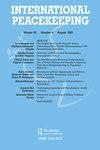A Perturbed Peace: Applying Complexity Theory to UN Peacekeeping
IF 1.3
2区 社会学
Q2 INTERNATIONAL RELATIONS
引用次数: 4
Abstract
ABSTRACT This article explores the application of complexity theory to UN peacekeeping. To date, peacekeeping has been dominated by linear models of change, assuming that conflict settings can be addressed by elite-driven peace processes, gradual improvements to state institutional capacity, and development programming. However, this article argues that complexity theory offers a far more accurate and useful lens through which to view the work of peacekeeping: conflict settings represent complex, interdependent socio-political systems with emergent qualities giving them the capacity to self-organize via feedback loops and other adaptive activity. Self-organization means such systems are highly resistant to attempts to change behaviour via top-down or input-output approaches. In fact, peacekeeping itself is endogenous to the systems it is trying to change, often displaying the same kinds of self-organization typical of complex systems elsewhere. Drawing on experience working and conducting fieldwork in the UN peacekeping mission in Democratic Republic of the Congo, this article argues that UN peacekeeping operations should view themselves as actors within the complex conflict ecosystem, looking to enable transformational change from within, rather than impose liberal Western models from without.动荡的和平:复杂性理论在联合国维和行动中的应用
本文探讨了复杂性理论在联合国维和行动中的应用。迄今为止,维持和平一直以线性变化模式为主,假设冲突环境可以通过精英驱动的和平进程、逐步提高国家机构能力和发展方案来解决。然而,本文认为,复杂性理论提供了一个更准确、更有用的视角来看待维和工作:冲突环境代表着复杂、相互依存的社会政治系统,具有突发性,使其能够通过反馈回路和其他适应性活动进行自组织。自组织意味着这样的系统高度抵制通过自上而下或投入产出方法改变行为的尝试。事实上,维和本身是其试图改变的系统的内在因素,经常表现出其他地方复杂系统的典型自组织。本文借鉴了联合国刚果民主共和国维和特派团的工作和实地调查经验,认为联合国维和行动应将自己视为复杂冲突生态系统中的行动者,寻求从内部实现转型变革,而不是从外部强加自由的西方模式。
本文章由计算机程序翻译,如有差异,请以英文原文为准。
求助全文
约1分钟内获得全文
求助全文

 求助内容:
求助内容: 应助结果提醒方式:
应助结果提醒方式:


